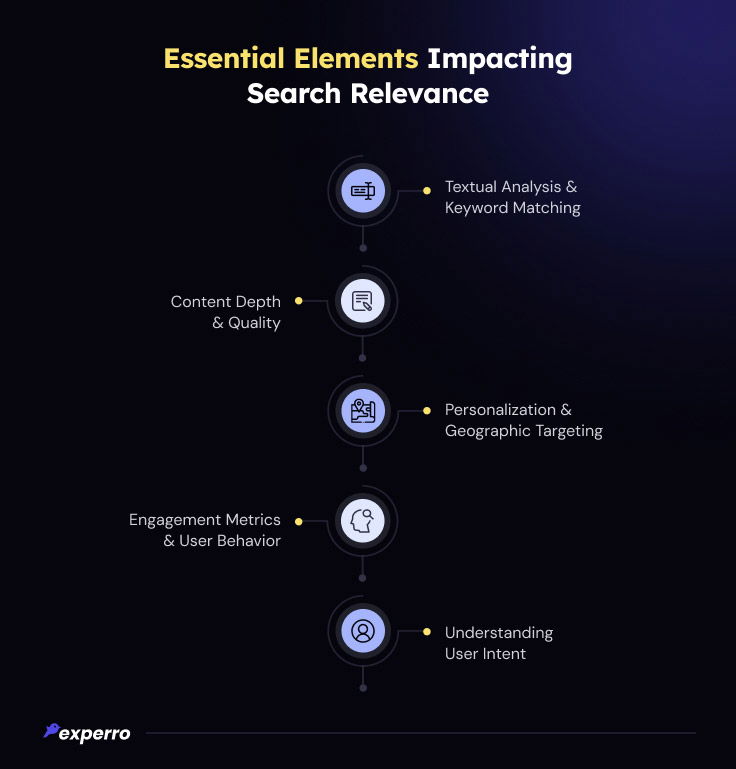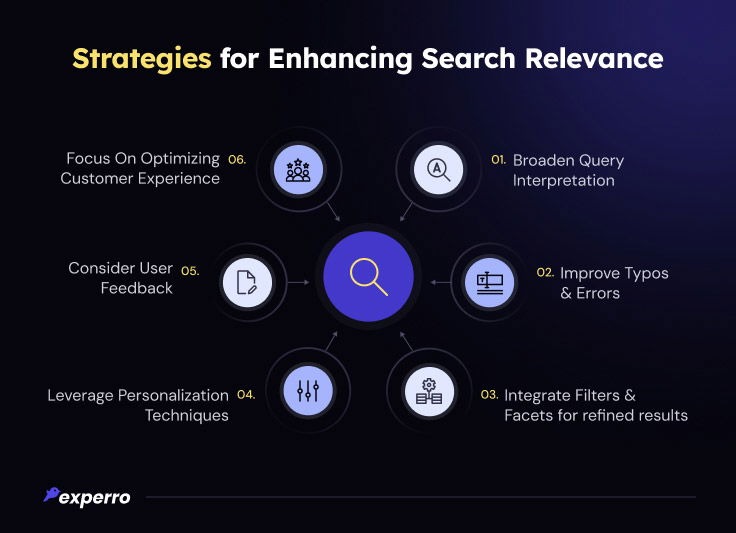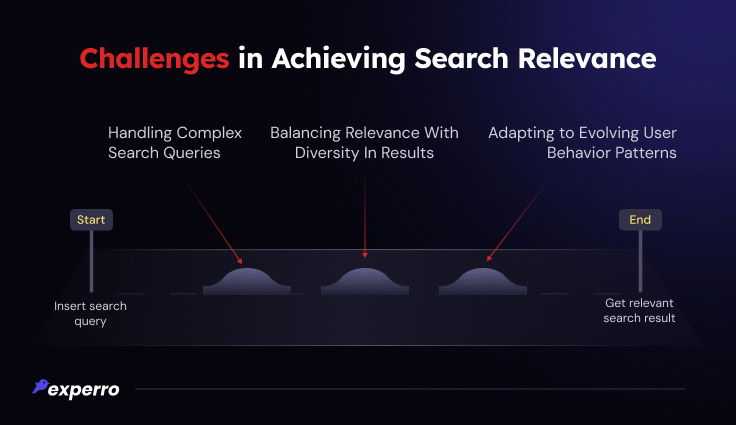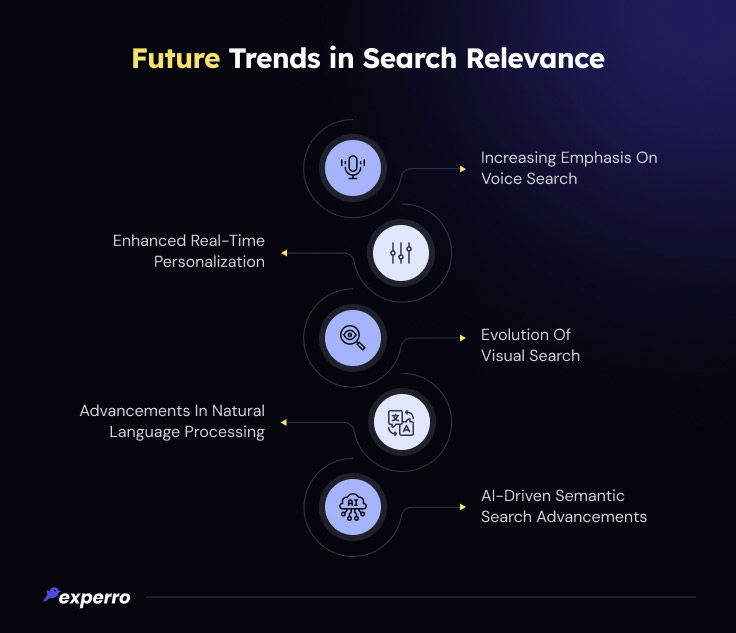Search Relevance: Leverage the Essence for eCommerce Success

What’s Inside
- What Is Search Relevance?
- What Is the Importance of Search Relevance?
- What Are the Essential Elements Impacting Relevance?
- How to Measure the Relevancy of Search?
- What Are the Strategies to Enhance Search Relevance Ratio?
- Key Challenges in Achieving Search Relevance
- What Are the Future Trends in Search Relevance?
- How Experro Enhances Search Relevance?
- Conclusion
Key Takeaways
- Search relevance boosts user satisfaction and business growth by delivering accurate results that drive engagement and conversions.
- Key factors that influence the accuracy of search outcomes include keyword matching, understanding user intent, and ensuring high-quality content.
- AI is transforming the future of search relevance with advancements in semantic search, voice search, and real-time personalization.
- Experro enhances search relevance by leveraging AI and ML to deliver personalized and accurate search results.
Ever tried searching for something and felt like the eCommerce search engine read your mind perfectly?
That smooth experience is a result of search relevance.
Whether you're looking for a specific product or browsing through content, the relevance of search results determines how efficiently you can find exactly what you need.
For businesses, query-to-result alignment directly impacts user satisfaction and conversion rates. But what makes a search ‘relevant’?
What Is Search Relevance?
Search relevance definition - Search relevance refers to how well search results match a user's query, ensuring they find what they are looking for efficiently.
Beyond just matching keywords, search relevance also factors in user intent, context, and past behaviors to deliver more personalized and accurate results.
In advanced systems, it uses techniques like predictive search and AI-based eCommerce search algorithms to continuously improve the quality of results, enhancing the overall user experience and driving better engagement.
What Is the Importance of Search Relevance?
eCommerce Search relevance is the cornerstone of any effective search system. Users expect accurate, timely, and useful results when they enter a search query.
If the results are relevant, the search experience will improve, leading to satisfaction and potential loss of business.
In eCommerce, where product search bar UI relevance is crucial, irrelevant results can lead to missed sales opportunities.
An effective search relevance algorithm considers factors like keyword matching and user intent to provide the most relevant search results.
By improving search relevance, businesses can boost user engagement, increase conversions, and enhance customer satisfaction.
What Are the Essential Elements Impacting Relevance?
The accuracy of search result relevance depends on several factors.

Here are some of the key elements that contribute to a more relevant search experience:
1. Textual Analysis and Keyword Matching
This is the foundation of search relevance. Searchandising algorithms rely heavily on analyzing the text in both the user’s query and the content to find keyword matches.
Accurate textual relevance ensures users get the most relevant results based on their search terms. Fine-tuning the search relevance score through keyword matching improves search accuracy.
2. Content Depth and Quality
The value of content also affects the relevance of search results. High-quality content that covers a topic in detail is more likely to rank higher in relevance search.
3. Personalization and Geographic Targeting
Personalization at scale is essential for improving search relevance. AI search relevance technologies consider factors like location, preferences, and browsing history.
For instance, eCommerce product search relevance evaluation can vary by region, offering tailored results based on geographic data.
4. Engagement Metrics and User Behavior
Measuring search relevance often involves analyzing engagement metrics. Click-through rates, bounce rates, and time spent on a page are important indicators that impact the search relevance evaluation process.
Algorithms adjust the search term relevance based on how users interact with the search results and their shopping behaviors tracked through eCommerce analytics.
5. Understanding User Intent
Web search engines now focus on a user's search intent to deliver results. By analyzing patterns, search relevance machine learning can predict what the user truly wants.
The algorithm adjusts to deliver relevant results based on past behavior, making the search bar experience more accurate and personalized.
How to Measure the Relevancy of Search?
The simplest formula to measure search relevance is...
Search Relevance + Personalization = Revenue
Measuring search relevance involves evaluating how well the search results align with user expectations. A search relevance score is generally used to quantify this alignment.
Key indicators include click-through rates, user satisfaction, and time spent on pages.
Regular search relevance testing can provide insights into what adjustments are necessary for improving search relevance over time.
Additionally, search relevance algorithms can be refined based on user feedback, engagement metrics, and data from eCommerce analytics tools, leading to more relevant search results.
What Are the Strategies to Enhance Search Relevance Ratio?
Optimizing search result relevance requires specific strategies.

Let’s explore some of the best approaches:
1. Broaden Query Interpretation
Users often use different phrases for the same concept. Understanding the search query and interpreting its meaning to the depth ensures relevant search results are displayed, even when users phrase things differently.
Algorithms can analyze synonyms and variations, offering a more expansive and inclusive search result relevance.
2. Improve Typos and Errors
Correcting user errors like typos is essential for search accuracy. Implementing an algorithm to calculate relevance tags, even with errors, ensures the search system provides the most relevant search experience.
This helps retain users who might otherwise get frustrated by missed searches.
3. Implement Filters and Facets for Refined Results
eCommerce Filters allow users narrow down their search, increasing search result relevance. By integrating facets like price, category, or brand, eCommerce search relevance can be optimized.
It helps users fine-tune their queries, ensuring more relevant searches and reducing irrelevant results.
4. Leverage Personalization Techniques
Using AI to personalize search results based on past behavior, preferences, and geography increases the relevance of search results.
Hyper-personalization techniques enhance user satisfaction and improve search relevance rankings.
5. Consider User Feedback to Improve Results
Gathering feedback through user interactions helps to refine search systems. Measuring search relevance metrics like satisfaction scores and incorporating this data into the algorithm boosts accuracy.
This feedback loop can optimize search relevance continuously.
6. Focus On Optimizing Customer Experience
The overall customer experience directly impacts search relevancy. A search system designed with the user in mind, from speed to ease of navigation, will deliver more relevant information.
This improves search relevance optimization, leading to increased conversions and customer loyalty.
Key Challenges in Achieving Search Relevance
As with any technology, there are challenges in maintaining optimal search result relevance:

1. Handling Complex Search Queries
Complex or multi-part queries can be difficult to interpret. An effective search relevance algorithm must dissect such queries and deliver accurate results.
AI-driven search intelligence is improving, but handling complex searches remains a key challenge.
2. Balancing Relevance With Diversity in Results
Offering diverse but relevant search results can be tricky. While delivering relevant searches is important, too much relevance might limit users' options.
Achieving the right balance between relevance and diversity in a product search engine helps ensure a satisfying search experience.
3. Adapting to Evolving User Behavior Patterns
User behavior changes over time, requiring search relevance optimization to evolve. Search engines must adapt by continuously learning from engagement metrics and feedback.
Keeping up with these changes ensures the search system stays relevant to the user's needs.
What Are the Future Trends in Search Relevance?
Relevant search results are evolving rapidly.

Here are the key trends shaping the future:
1. AI-driven Semantic Search Advancements
Semantic search powered by AI is transforming how search engines understand user queries. This allows search relevance systems to better interpret the meaning behind words, delivering more accurate and relevant search results page.
2. Increasing Emphasis on Voice Search
Voice search function is becoming more common, and search relevance algorithms need to adjust. Voice queries tend to be longer and more conversational, requiring search systems to interpret them accurately for relevant search experiences.
3. Advancements in Natural Language Processing
Natural language search technologies are improving result relevance by better understanding the nuances of language. These advancements help search relevance systems deliver more context-aware results.
4. Enhanced Real-Time Personalization
Personalization in search results is getting more sophisticated. A recent survey from Bridgenext says - 70% of retailers leveraging advanced personalization reported an ROI increase of 200% or more.
AI-driven systems can provide real-time adjustments to search results based on user actions, leading to more relevant searches and better customer experiences.
5. Evolution of Visual Search
Visual search is gaining traction, especially in eCommerce. Future search relevance systems will need to integrate visual recognition technology to provide relevant search experiences based on images rather than text alone.
How Experro Enhances Search Relevance?
Experro enhances accuracy through advanced algorithms and personalization.
The platform’s ability to analyze user behavior and engagement metrics allows it to deliver more accurate and relevant searches.
With AI-powered search and eCommerce merchandising, Experro ensures product offerings are strategically displayed to enhance discoverability and relevance.
Additionally, Experro provides refined filters and facets, improving product search relevance evaluation. The platform’s focus on customer experience ensures that search relevance testing is always evolving.
By offering real-time personalization, Experro creates a more relevant search experience that drives conversions for businesses.
Conclusion
Contextual relevance in search is critical for delivering accurate, useful results. Optimizing accuracy not only enhances user satisfaction but also increases business growth.
As AI and ML technologies evolve, relevant search results will become more dynamic and personalized.
Businesses must invest in improving search relevance algorithms, measuring search relevance, and leveraging personalization techniques to stay competitive in the digital market.
To learn more about delivering more precise search results to your customers, get on a call with our team.
FAQs




Pallavi Dadhich
04 October 2024Pallavi is an ambitious author known for her expertise in crafting compelling content across various domains. Beyond her professional pursuits, Pallavi is deeply passionate about continuous learning, often immersing herself in the latest industry trends. When not weaving words, she dedicates her time to mastering graphic design.